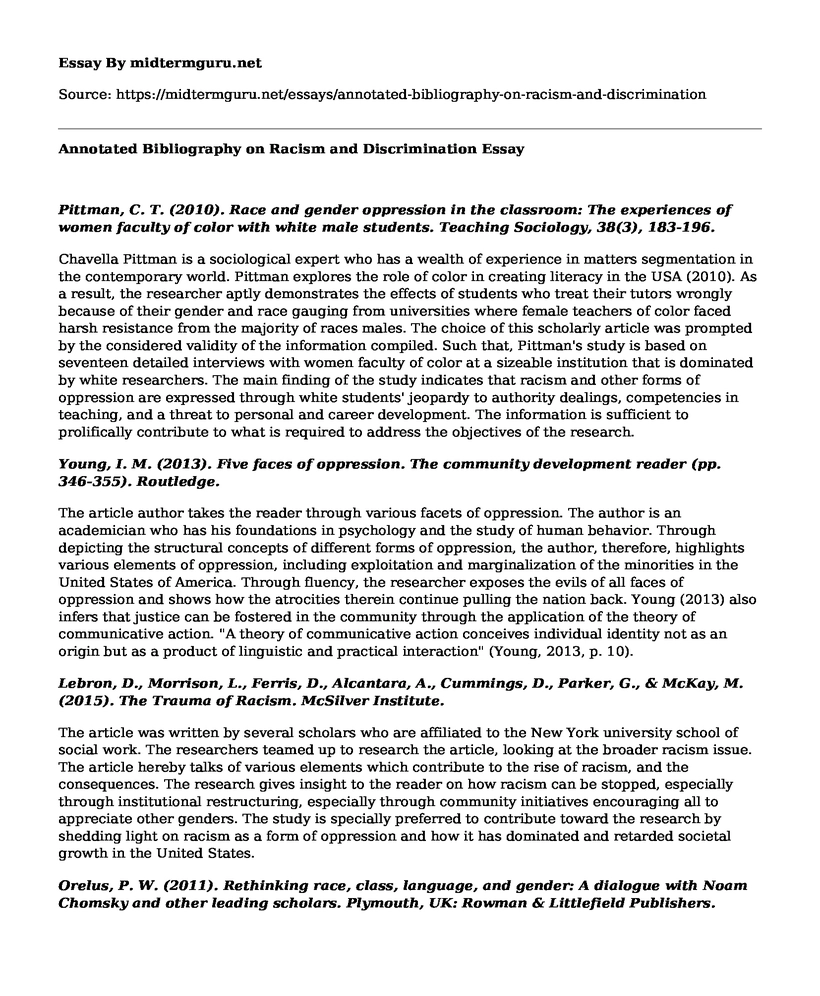Pittman, C. T. (2010). Race and gender oppression in the classroom: The experiences of women faculty of color with white male students. Teaching Sociology, 38(3), 183-196.
Chavella Pittman is a sociological expert who has a wealth of experience in matters segmentation in the contemporary world. Pittman explores the role of color in creating literacy in the USA (2010). As a result, the researcher aptly demonstrates the effects of students who treat their tutors wrongly because of their gender and race gauging from universities where female teachers of color faced harsh resistance from the majority of races males. The choice of this scholarly article was prompted by the considered validity of the information compiled. Such that, Pittman's study is based on seventeen detailed interviews with women faculty of color at a sizeable institution that is dominated by white researchers. The main finding of the study indicates that racism and other forms of oppression are expressed through white students' jeopardy to authority dealings, competencies in teaching, and a threat to personal and career development. The information is sufficient to prolifically contribute to what is required to address the objectives of the research.
Young, I. M. (2013). Five faces of oppression. The community development reader (pp. 346-355). Routledge.
The article author takes the reader through various facets of oppression. The author is an academician who has his foundations in psychology and the study of human behavior. Through depicting the structural concepts of different forms of oppression, the author, therefore, highlights various elements of oppression, including exploitation and marginalization of the minorities in the United States of America. Through fluency, the researcher exposes the evils of all faces of oppression and shows how the atrocities therein continue pulling the nation back. Young (2013) also infers that justice can be fostered in the community through the application of the theory of communicative action. "A theory of communicative action conceives individual identity not as an origin but as a product of linguistic and practical interaction" (Young, 2013, p. 10).
Lebron, D., Morrison, L., Ferris, D., Alcantara, A., Cummings, D., Parker, G., & McKay, M. (2015). The Trauma of Racism. McSilver Institute.
The article was written by several scholars who are affiliated to the New York university school of social work. The researchers teamed up to research the article, looking at the broader racism issue. The article hereby talks of various elements which contribute to the rise of racism, and the consequences. The research gives insight to the reader on how racism can be stopped, especially through institutional restructuring, especially through community initiatives encouraging all to appreciate other genders. The study is specially preferred to contribute toward the research by shedding light on racism as a form of oppression and how it has dominated and retarded societal growth in the United States.
Orelus, P. W. (2011). Rethinking race, class, language, and gender: A dialogue with Noam Chomsky and other leading scholars. Plymouth, UK: Rowman & Littlefield Publishers.
This source is a book that is rich in relevant information to the research on oppression in the United States. The book portrays an in-depth perception of how racism, classification, language-based segregation, and gender manifest oppression on an unprecedented level. Stereotypes are reported to have contributed to gaps between the American races (Orelus, 2011). The phenomenon, in turn, makes it difficult for the natives to co-exist peacefully while pursuing social and societal goals and objectives. Far-fetched generalities of races make it hard to contain the issues that deter development and healthy social relationships. From the book:
Critics complain about feeling pressured not to criticize the president because he is of "mixed race." Right-wingers accused first Lady Michele Obama of not attending the funeral of White senator Robert Byrd because she has "authentic slave blood," whereas President Obama does not possess such blood (Orelus, 2011, p. 8).
The information for the book is in-depth and analytical of how oppressions are fostered through racial boundaries, classification, languages, and sexism. It is thus prolifically contributory to reviewing the issue of oppression across the United States. The book provides evidence-based data and information that can help in addressing the chain of causality for oppression in the United States.
References
Lebron, D., Morrison, L., Ferris, D., Alcantara, A., Cummings, D., Parker, G., & McKay, M. (2015). The Trauma of Racism. McSilver Institute. PDF.
Orelus, P. W. (2011). Rethinking race, class, language, and gender: A dialogue with Noam Chomsky and other leading scholars. Plymouth, UK: Rowman & Littlefield Publishers. PDF.
Pittman, C. T. (2010). Race and gender oppression in the classroom: The experiences of women faculty of color with white male students. Teaching Sociology, 38(3), 183-196. PDF.
Young, I. M. (2013). Five faces of oppression. The community development reader (pp. 346-355). Routledge. PDF.
Cite this page
Annotated Bibliography on Racism and Discrimination. (2023, Feb 07). Retrieved from https://midtermguru.com/essays/annotated-bibliography-on-racism-and-discrimination
If you are the original author of this essay and no longer wish to have it published on the midtermguru.com website, please click below to request its removal:
- Essay Example: Tobacco and Caffeine in the Chemistry of Everyday Life
- Defining Terrorism - Essay Sample
- Essay on Global Stratification of Wealth, Income and Power
- The Racism Continues in the US: Essay Sample
- Development: Freedom, Prosperity, Quality Services, Poverty Eradication - Essay Sample
- The Equal Employment Opportunity Act: Fighting Discrimination in the US - Essay Sample
- Radicalized Terrorists - Research Paper







